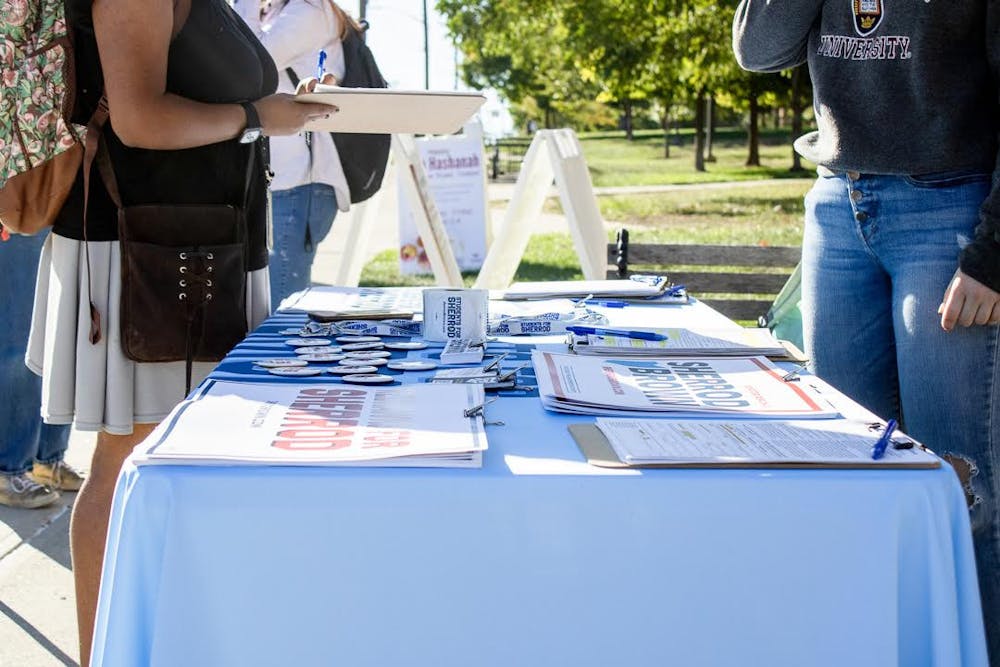The November presidential election is nearly here. Miami University students may be voting early, sending in absentee ballots or preparing to go vote on election day. However, being on a college campus is not always convenient when it comes to voting.
Throughout election history, the term “disenfranchised” has been used to describe people without the right to vote. Often, it references people who are legally unable to vote, but it has since expanded to include people who face obstacles preventing their ability to vote.
Patrick Houlihan, president of the College Democrats of Ohio, president of the College Democrats at Miami University and Northwest Regional Chair of the Butler County Democratic party, described the word “disenfranchised” as a loaded term with different ways it can be approached.
Houlihan started by discussing how Secretary of State Frank LaRose helped pass laws requiring photo ID to vote in Ohio. This can make it more difficult for people to vote, especially for students who can’t drive or don’t have photo identification.
“Students face those issues all the time when it comes to voting,” Houlihan said. “Information is inaccessible, and there are organizations on campus that do their best to proliferate materials and information, but it just doesn’t reach everybody, and there are students that will go and try to vote in Ohio and then be turned away because they don’t have an Ohio driver’s license.”
Houlihan said that while these regulations are presented under the guise of election integrity and protection, it’s not difficult to identify someone without photo identification and if they are registered to vote, they should be able to.
He also touched on how the issues on the ballot could affect these students, as well as why students should care about this election. He talked specifically about Issue 1, the constitutional amendment that states it will ban gerrymandering in Ohio, which he said has some of the most corrupt maps in the nation.
“Having politicians draw their own maps and make districts that are favorable to them, rather than the will of the people, is directly against our democratic values and takes power out of the people’s hands,” Houlihan said.
Kevin Reuning, an associate professor in the political science department, said disenfranchised can also mean people who are restricted from access to voting in meaningful ways.
“Disenfranchised is, at a minimum, people who are not legally able to vote,” Reuning said. “It’s sometimes also then applied to people who might legally have the right to vote, but there are impediments.”
Reuning said that for students who are having a hard time getting access to information on how to cast their vote, the Dean of Students has information available for them. He also said there are student resources, including Associated Student Government (ASG), on campus working to ensure students are educated.
“In the end, elections are the most direct way to have a voice in governance,” Reuning said.
Enjoy what you're reading?
Signup for our newsletter
Reuning’s wife works as a poll worker, and he said one of the most frequent obstacles preventing students from casting their votes is not realizing they had to be registered to vote in Oxford.
Madeline Irvin, a senior biochemistry major, is registered to vote in Illinois. She said she hasn’t faced any issues herself and that voting seems easily accessible on Miami’s campus, but she has heard stories of that not being the case.
While Irvin has not yet voted, she plans on sending in her mail-in ballot soon. Irvin said while it has been a fairly smooth process for her, getting the ballots in on time can be difficult.
“Receiving on time is difficult,” Irvin said. “I know there was a car parked in front of our mailbox, so we didn’t get mail for a week and didn’t even realize. So if we hadn’t realized, [then] the mail-in ballots probably wouldn’t have [been] picked up.”
Students can visit the Miami’s Libraries website for more resources and information about voting.




